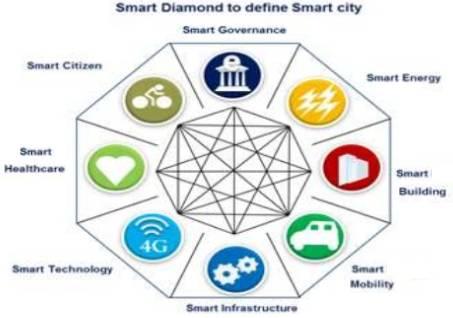Smart City: 10 Advantages and 5 Disadvantages
Advertisement
This page explores the advantages and disadvantages of smart cities, along with the necessary infrastructure to create one. It covers the benefits and drawbacks of smart city development.
What is a Smart City?
Introduction:
A smart city is equipped with essential infrastructure to provide a decent quality of life and a clean, sustainable environment. This is achieved through the application of smart solutions in various areas, including:
- Economy
- Mobility
- Technology
- Energy
- Infrastructure
- Environment
- People
- Living
- Government
In essence, a smart city focuses on creating a better place for its residents.
It leverages digital technology across all city functions and utilizes ICT (Information and Communication Technologies) to enhance quality and performance.

Figure 1: Components of a Smart City
The figure above illustrates the key components of a smart city:
- Smart Economy: Fosters high-quality, high-paying jobs while empowering local businesses to compete globally.
- Smart People: A knowledgeable workforce that embraces creativity, innovation, and new approaches, supported by community leaders and mentors, meeting the evolving needs of employers.
- Smart Governance: Ensures efficient resource utilization to improve living standards.
- Smart Environment: Promotes sustainable growth while protecting natural resources, harmonizing living and workspaces, and balancing energy supply and demand.
- Smart Living: Offers opportunities for a healthy lifestyle for all citizens, including quality healthcare, education, and safety.
- Smart Technology: Utilizes advanced wireless technologies like Zigbee, Z-Wave, Bluetooth, LoRaWAN, and IoT (Internet of Things) network architecture to automate household devices and more.
- Smart Energy: Employs smart grids to provide continuous electricity with energy conservation capabilities.
- Smart Healthcare: Provides advanced facilities, including remote monitoring, for improved patient care.
- Smart Mobility: Implements modern transportation systems using cutting-edge technologies for smart mobility solutions.
Smart cities must include these infrastructures to provide a better quality of life for their citizens. These solutions should contribute to a cleaner and more sustainable environment. Smartphones and mobile applications are crucial, providing valuable information such as traffic updates, health services, alerts, and news. Low Power Wide Area Networks based on IoT wireless technologies like LoRaWAN, Sigfox, LTE-M, and NB-IoT are instrumental in achieving the goals of a smart city.
Benefits or Advantages of a Smart City
Here are the key benefits and advantages of a smart city:
- Resource Efficiency: Enables people to live, work, and enjoy leisure activities with fewer resources.
- Improved Efficiency: Streamlines community systems, including physical infrastructure (transport, power, water) and administration.
- Energy Conservation: Smart energy systems help conserve energy, reducing costs.
- Real-time Monitoring: Employs real-time monitoring to address water leaks, sewage, and drainage issues.
- Time and Cost Savings: Use cases like smart parking and smart lighting save time and money.
- Enhanced Production: Facilitates organic food production, ensures safe products, and reduces delivery costs.
- Environmental Control: Aids in controlling water resources, protecting the environment, and conserving animal populations.
- Smart Waste Management: Promotes smart waste management, recycling, and reuse.
- Easy Mobile Payments: Simplifies mobile payments and enables online ordering apps.
- Intelligent Transportation: Delivers intelligent rail and other transit solutions.
- Asset Tracking and Fleet Management: Enables asset tracking, smart roads, and fleet management.
Drawbacks or Disadvantages of a Smart City
Here are the drawbacks and disadvantages of smart cities:
- Underdeveloped Business Models: Business models for deploying smart technologies are still in early stages.
- Pre-Commercial Technologies: Even with funding, many smart technologies are still in pre-commercial stages.
- Lack of Skills and Capacity: Cities often lack the necessary technology-related skills and capacity.
- Interdepartmental Challenges: Cities struggle to collaborate across departments and boundaries.
- Data Privacy and Security Concerns: Concerns exist regarding data privacy and security.
- Lack of Understanding of Data Value: Councils, businesses, and other stakeholders don’t fully grasp the value and benefits that data can generate, hindering business case development.
- Technology Adoption Barriers: Adopting smart city technologies requires specific knowledge, and without training, people may find them irrelevant and difficult to use.
Conclusion
The listed advantages of smart cities will help developers attract more customers. Furthermore, understanding the disadvantages of smart cities helps in successfully addressing the challenges that may arise during their development and growth.
Advertisement
 RF
RF







